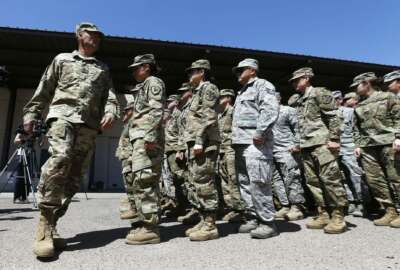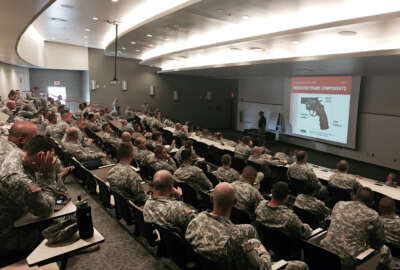National Guard promotion provision makes it into House NDAA
A way for guardsmen to get paid for the time they wait for promotions is in the works in the new defense authorization bill.
National Guard officers just got a lot closer to receiving backdated pay for long promotion waits.
The House Armed Services Committee adopted an amendment last week requiring National Guard officers get paid retroactively from the time they are promoted to the time it takes the federal government to approve the promotion.
The amendment is now attached to the House version of a bill that has passed 57 years in a row, one of the few bills that actually makes it through the legislative process each year.
Some guardsmen wait more than half a year from the time they are nominated for a new rank to the time it takes for the Defense Department to approve it.
“There’s a back pay issue, where you don’t get your next rank’s pay until you are recognized in that position. You’re serving in a grade that’s higher. You’re serving in that next position, but you’re not getting that time in grade,” J.C. Cardinale, legislative affairs manager at the National Guard Association of the United States (NGAUS) told Federal News Radio. “What it really comes down to is a retention issue for us. You’re creating this deep frustration in the Guard.”
An independent bill is already floating around in the House and Senate requiring guardsmen receive backdated pay and that DoD notify Congress when a promotion takes more than 200 days.
The amendment holds basically the same language and was introduced by Rep. Carol Shea-Porter (D-N.H.).
The National Guard promotion issue started gaining attention after NGAUS released a survey stating 49 percent of the more than 3,100 guardsmen they polled said more than 196 days passed between state recognition and federal recognition of a promotion. Of the rest, 37 percent waited between 196 days and 120 days and only 14 percent were promoted in less than 120 days.
“It’s not right to make our junior officers wait months and months to receive the pay and benefits they have earned because of bureaucratic delays. I’ve heard from Massachusetts Guard members who are frustrated by these delays — our bipartisan bill takes simple steps to fix the problem and do right by our dedicated men and women in uniform,” Sen. Elizabeth Warren (D-Mass.), who sponsored the independent bill, said in a May 8 release.
Top Defense Stories
Warren grilled Army Secretary Mark Esper on the issue last month during a Senate Armed Services Committee hearing.
Esper acknowledged the wait time for National Guard promotions is out of hand.
Esper said one of the main issues is the process itself.
“The numbers are too long and unacceptable and frankly in my time in the Guard I had a similar action happen to me,” Esper said. “What we are doing is we are digging through it right now. Part of the challenge is there are multiple steps. The process begins at the state [adjutant general] level and goes through the [National Guard Bureau], the G-1 (Army Personnel} and in some cases the Senate if it’s a colonel or above.”
The secretary noted the Army added more manpower to the problem and is looking into better automation.
“I think there are ways we can reduce the time. There’s about 30 to 45 days added on to determine they have exhibited exemplary behavior and then there are other things out there that may require congressional action,” Esper said. “Part of the process as I understand is the scrolling, which is an antiquated pen and paper process, which also adds time to it. We are trying to attack it on a number of fronts, but it needs to be much, much more timely.”
Read more of the DoD Personnel Notebook.
Copyright © 2024 Federal News Network. All rights reserved. This website is not intended for users located within the European Economic Area.
Scott Maucione is a defense reporter for Federal News Network and reports on human capital, workforce and the Defense Department at-large.
Follow @smaucioneWFED





